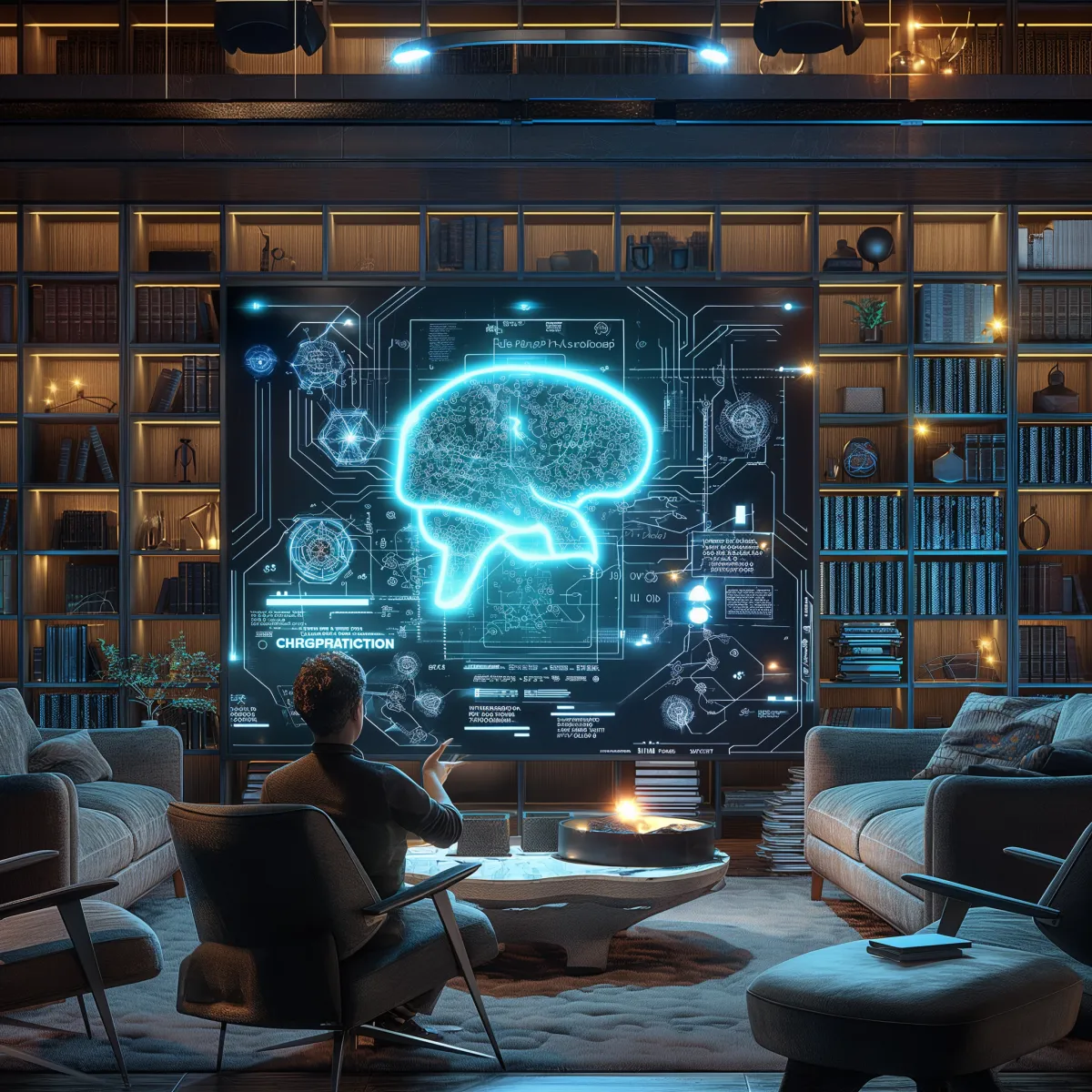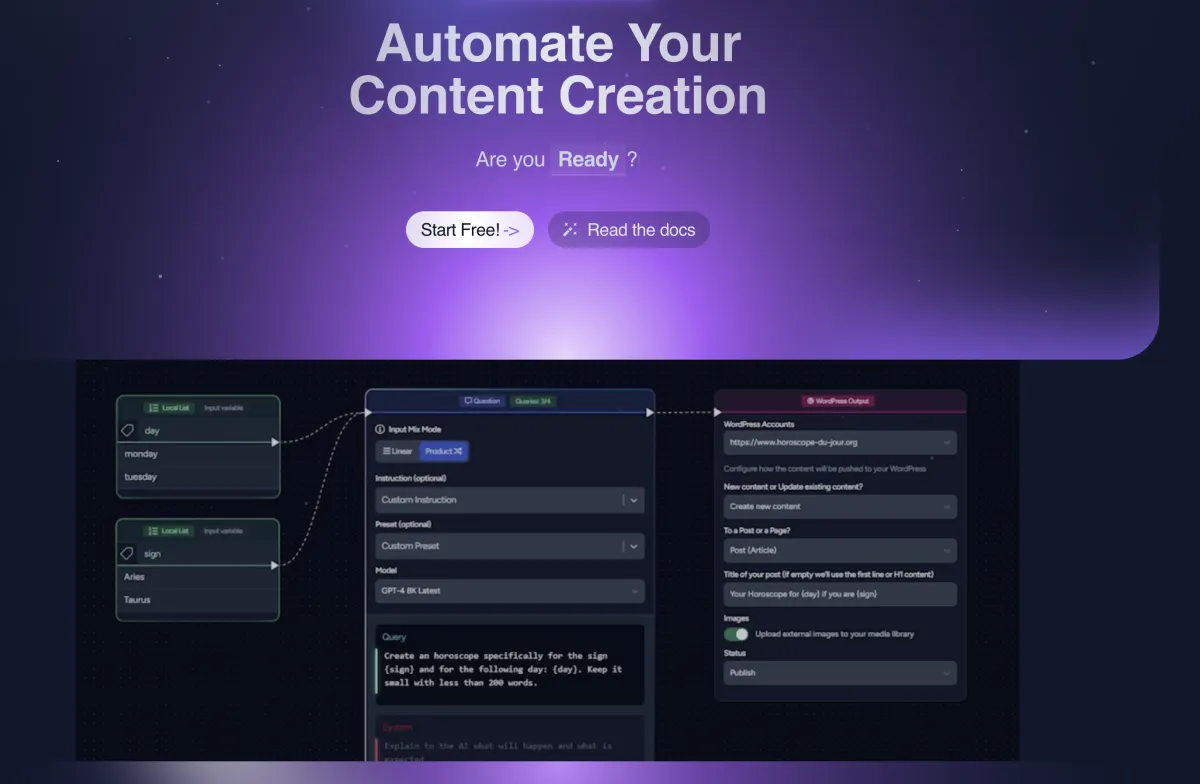Making Ai work
for you.
Customized solutions.
Customized learning.

As an Entrepreneur
Need AI skills to innovate and drive growth in your business.
Have a limited budget and time to invest in formal education or training programs.
Desire for practical, applicable knowledge to implement Ai solutions in your business operations.
15minAi's mini-courses
Focus on practical Ai applications and strategies for business growth.
Provide affordable and flexible learning options, without breaking the bank or disrupting your busy schedule.
Equip you with actionable insights and real-world case studies, enabling you to leverage Ai effectively to solve business challenges and drive innovation.
As a Student
Limited availability of Ai courses or resources at your educational institution.
Desire for additional learning outside of the traditional classroom environment.
Need for practical, hands-on experience to supplement theoretical knowledge.
15minAi's mini-courses
Cover various Ai topics, complementing and enhancing the curriculum offered by universities.
Provide an accessible and engaging, creator-led platform for students to explore Ai concepts beyond the confines of the classroom.
Include interactive projects and assignments, allowing students to apply theoretical knowledge to real-world scenarios and gain valuable practical experience.
As a Working Professional
Limited time to pursue formal education or attend in-person classes.
Difficulty keeping up with the rapidly evolving field of Ai.
Need for continuous learning and skill development to stay competitive in the job market.
15minAi's mini-courses
Offer short, digestible lessons that can be completed in as little as 15 minutes, making it easier to fit learning into your schedule.
Cover a wide range of Ai topics, from basics to advanced concepts, allowing you to stay updated on the latest trends and technologies in your field.
Provide on-demand access to high-quality learning resources, enabling you to up-skill and re-skill at your own pace and convenience.
Our Promise
Our tools and learning platforms are built to the highest standards. Whether you're learning new tricks from one of our education creators or leveraging one of our custom solutions, your satisfaction is guaranteed.

Toolbox
Learn about our featured industry solutions for marketing, healthcare, and engineering.

Custom Solutions
Looking to build your own Ai-integrated tool? You've come to the right place.

Courses
Whether it's Machine Learning, Deep Learning, Natural Language Processing, Computer Vision, or Data Science, we've got you covered.

5k+Courses

100+Tools

100+Creators
About Us
Our Mission
Our team is dedicated to helping you get the most out of Ai. We pride ourselves on bringing people together and building a platform where specialized tools meet your needs and education happens on a customized level. People are unique – they learn differently, they problem solve differently, and they apply knowledge differently. Big Box, one-size-fits-all Ai solutions are expensive and lack flexibility and individuality. If you are looking to browse industry-specific tools, build your own customized tool, or learn how to properly use existing tools, this is the place for you.

Wren Gregory, PhD
Physicist, Co-founder
Wren Gregory is a devoted mother, wife, scientist and lifelong learner. She earned her doctorate in condensed matter physics studying nanomaterials and their role in enhanced spectroscopy techniques for disease diagnostics. She has continued her passion for healthcare as a senior scientist and director of clinical research operations at a precision medicine and software company out of South Carolina. Wren co-founded 15minAi with the goal of providing a platform for citizen experts in artificial intelligence techniques and tools to teach the public in a simple and effective format. She has experienced first-hand the significance in efficiency of incorporating Ai into daily workflows, but understands that every tool is not for every person or every task, and that teaching is not reserved for “experts.” Wren enjoys spending time in nature camping and fishing with her family and friends.

Leon Zheng
Medical Device Innovator, Co-founder
As a seasoned innovator in the field of medical technology with over 25 years of experience, Leon has saved the lives of more than 30,000 patients through his groundbreaking technologies for cancer treatment. Holding 15 international patents, his commitment to advancing healthcare extends to advocating for the widespread adoption of artificial intelligence (Ai). With a goal to introduce AI technology to benefit 3 million people within the next five years, Leon is dedicated to making a lasting impact on patient care and outcomes worldwide. Leon's expertise and passion drive him to bridge the gap between technology and healthcare, ensuring that innovative solutions reach those who need them most.
This month's
Top Rated Courses
Elevate Your Expertise with the People's Choice for Best Courses for Learning and Mastering Essential Skills in Ai.
Plus over 5,000
additional courses you can explore!
Efficiency Corner Ai Tool of the week
An AI-powered platform that allows users to create and execute customized AI workflows, "Flows," allows for streamlining various tasks such as content generation, data analysis, and automation. It provides a user-friendly interface to define the scope and execution method of AI queries through "Instructions." The platform operates on a unit-based pricing model, where each AI query incurs a cost in units, and users can subscribe to plans to receive a specific number of units. It emphasizes a streamlined process, where input nodes feed data to a question node, which processes the information and forwards the output to designated output nodes. This modular approach enables users to build tailored AI solutions by combining different components within a Flow. The platform prioritizes privacy and transparency, providing a detailed privacy policy outlining its data handling practices.

Our Latest Articles

Unveiling AI Agents Trends 2024: Exploring Personalization, Multi-Modal Capabilities, and Ethical Practices
Introduction:
In the dynamic landscape of artificial intelligence, AI agents stand out as versatile tools driving innovation across various industries. This blog delves into the cutting-edge trends reshaping AI agents in 2024 and their profound impact on personalized experiences, multi-modal capabilities, and ethical practices.

"AI agents are poised to be the architects of a new era, transforming industries and reshaping our world with their unprecedented capabilities. In 2024, we stand on the brink of a technological revolution driven by the ingenuity and adaptability of these intelligent systems." - Sam Altman
Enhanced Personalization:
AI agents in 2024 are revolutionizing user experiences through enhanced personalization. By leveraging advanced algorithms, they deliver tailored recommendations, adaptive interfaces, and customized interactions, thereby amplifying user satisfaction and engagement.
In a world inundated with information and choices, personalization has become paramount. AI agents, powered by sophisticated machine learning algorithms, analyze vast amounts of user data to understand preferences, behaviors, and needs. This deep understanding enables AI agents to curate personalized experiences, recommending products, services, and content that resonate with individual users.
Imagine logging into your favorite streaming platform and being greeted by a homepage tailored specifically to your tastes. AI agents analyze your viewing history, genre preferences, and even mood indicators to surface content that matches your interests. Whether you're in the mood for a suspenseful thriller or a light-hearted comedy, AI agents ensure that your viewing experience is both enjoyable and personalized.
Moreover, AI agents extend personalization beyond content recommendations to user interfaces. In 2024, interfaces adapt in real-time based on user interactions, preferences, and accessibility needs. Whether you're navigating a website, mobile app, or smart device, the interface adjusts seamlessly to provide a tailored experience that enhances usability and accessibility for all users.
Multi-Modal Capabilities:
The integration of text, voice, and visual inputs marks a significant leap in AI agent capabilities. In 2024, AI agents seamlessly interact across platforms, offering accessibility features and catering to diverse user preferences through their multi-modal prowess.
Gone are the days of siloed communication channels. In 2024, AI agents excel at understanding and processing inputs across multiple modalities, including text, voice, and visual cues. This multi-modal capability enables users to interact with AI agents using their preferred mode of communication, whether it's typing a message, speaking a command, or sharing an image.
For example, imagine using a virtual assistant to book a restaurant reservation. In 2024, AI agents can process your request regardless of how you communicate it. You can type out your reservation details, speak them aloud, or even take a photo of a restaurant menu and let the AI agent extract the relevant information. This flexibility and adaptability streamline the user experience, making interactions with AI agents more intuitive and efficient.
Furthermore, multi-modal AI agents enhance accessibility for users with diverse needs. By accommodating different modes of interaction, AI agents ensure that all users, regardless of physical abilities or communication preferences, can effectively engage with AI-powered systems. This inclusivity underscores the transformative potential of AI agents in promoting accessibility and inclusivity in digital environments.
Ethical AI Practices:
Ethical considerations are at the forefront of AI development in 2024. Bias mitigation strategies, transparency, and compliance with regulatory standards ensure that AI agents operate ethically, fostering trust and accountability in their interactions with users and stakeholders.
As AI technologies become increasingly integrated into our daily lives, concerns about their ethical implications have garnered significant attention. In response, AI developers and practitioners are prioritizing ethical considerations throughout the development lifecycle, from data collection and model training to deployment and usage.
One of the key ethical challenges in AI development is bias mitigation. AI systems are only as unbiased as the data they are trained on, and without careful consideration, they can perpetuate and amplify existing biases present in the data. In 2024, AI developers employ a variety of techniques, such as data preprocessing, algorithmic fairness constraints, and bias-aware training, to mitigate bias and promote fairness in AI systems.
Transparency is another essential aspect of ethical AI practices. In 2024, AI developers prioritize transparency by providing users with insights into how AI systems make decisions and recommendations. Explainable AI techniques, such as attention mechanisms and model interpretability methods, enable users to understand the reasoning behind AI-generated outputs, fostering trust and accountability in AI-powered systems.
Furthermore, ethical AI practices extend beyond technical considerations to encompass legal and regulatory compliance. In 2024, AI developers adhere to stringent regulatory standards, such as GDPR in Europe and similar data protection laws worldwide, to ensure that AI systems respect user privacy and data rights. By upholding ethical principles and regulatory compliance, AI developers and practitioners uphold the integrity and trustworthiness of AI-powered systems, laying the foundation for responsible AI innovation in the years to come.
Collaborative AI Systems:
2024 witnesses the rise of collaborative AI systems, where human-machine synergy thrives in work environments. AI agents collaborate with humans and each other, facilitating teamwork for complex tasks, leveraging federated learning, and distributed intelligence for optimal outcomes.
The traditional paradigm of human vs. machine is giving way to a new era of collaboration, where humans and AI agents work together as partners to achieve shared goals. In 2024, collaborative AI systems harness the complementary strengths of humans and machines, combining human creativity, intuition, and domain expertise with the speed, efficiency, and scalability of AI algorithms.
One example of collaborative AI systems in action is in the field of scientific research. In 2024, AI agents collaborate with researchers to analyze vast amounts of data, identify patterns, and generate hypotheses, accelerating the pace of scientific discovery. By automating repetitive tasks and augmenting human decision-making, AI agents empower researchers to focus on high-level tasks that require human creativity and critical thinking.
Furthermore, collaborative AI systems extend beyond human-machine collaboration to encompass collaboration between AI agents themselves. In 2024, AI agents form networks and federations, sharing knowledge, insights, and resources to solve complex problems that no single agent could tackle alone. Federated learning, a decentralized machine learning approach where multiple AI agents collaboratively train a shared model without exchanging raw data, enables AI agents to learn from diverse datasets while preserving data privacy and security.
The emergence of collaborative AI systems heralds a new era of teamwork and synergy, where humans and AI agents work together as partners to achieve collective intelligence and drive innovation across diverse domains.
Edge AI and IoT Integration:
The convergence of AI with edge computing and the Internet of Things (IoT) unlocks new frontiers in 2024. AI agents deployed on edge devices enable real-time decision-making, while stringent privacy and security measures safeguard sensitive data in IoT ecosystems.
Edge AI refers to the deployment of AI algorithms and models directly on edge devices, such as smartphones, wearables, and IoT sensors, rather than relying on centralized cloud servers for processing. This decentralized approach offers several advantages, including reduced latency, enhanced privacy, and improved reliability, making it ideal for applications requiring real-time decision-making and local data processing.
In 2024, edge AI is driving innovation across a wide range of industries, from healthcare and manufacturing to smart cities and autonomous vehicles. For example, in healthcare, edge AI enables wearable devices to monitor vital signs, analyze health data in real-time, and provide personalized health insights to users, empowering individuals to take proactive steps towards better health outcomes.
Moreover, edge AI facilitates secure and privacy-preserving data processing in IoT ecosystems. By processing data locally on edge devices, AI agents minimize the need for data transmission over insecure networks, reducing the risk of data breaches and unauthorized access. Additionally, edge AI enables selective data sharing, allowing users to retain control over their data while still benefiting from AI-driven insights and services.
However, deploying AI agents on edge devices also poses technical challenges, such as limited computational resources, power constraints, and heterogeneous hardware architectures. In 2024, AI developers address these challenges through optimizations, such as model compression, quantization, and hardware acceleration, to ensure efficient and scalable deployment of AI agents on edge devices.
Overall, the integration of AI with edge computing and IoT heralds a new era of intelligent edge devices, where AI agents empower devices to make autonomous decisions, interact with the physical world, and unlock new opportunities for innovation and growth.
AI Agents in Healthcare:
In the healthcare sector, AI agents are catalysts for transformative change in 2024. They enable personalized medicine, remote patient monitoring, and AI-powered diagnosis assistance, enhancing patient care, and clinical outcomes.
The healthcare industry is undergoing a paradigm shift driven by advancements in AI technology. In 2024, AI agents are revolutionizing healthcare delivery, enabling healthcare providers to deliver more personalized, efficient, and accessible care to patients worldwide.
One of the key applications of AI agents in healthcare is personalized medicine. By analyzing patient data, including genetic information, medical history, and lifestyle factors, AI agents can predict disease risk, tailor treatment plans, and optimize medication regimens to individual patients' needs. This precision medicine approach improves treatment outcomes, reduces adverse effects, and enhances patient satisfaction.
Furthermore, AI agents facilitate remote patient monitoring, enabling healthcare providers to remotely monitor patients' vital signs, symptoms, and adherence to treatment plans from the comfort of their homes. Wearable devices equipped with AI algorithms can detect early signs of deterioration, alerting healthcare providers to intervene proactively and prevent complications before they escalate.
Additionally, AI-powered diagnosis assistance tools augment clinicians' decision-making capabilities, providing real-time insights and recommendations based on medical imaging, laboratory tests, and clinical data. AI agents can analyze medical images, such as X-rays, MRIs, and CT scans, to identify abnormalities and assist radiologists in interpreting findings accurately and efficiently.
In 2024, AI agents are poised to transform healthcare delivery, empowering patients, clinicians, and healthcare organizations to achieve better health outcomes, improve patient satisfaction, and reduce healthcare costs.
AI Agents in Education:
Education undergoes a paradigm shift in 2024 with AI agents revolutionizing learning experiences. Adaptive learning environments, virtual tutors, and individualized learning paths empower learners, fostering knowledge acquisition and skill development.
Education is the foundation of societal progress and economic prosperity. In 2024, AI agents are reshaping the educational landscape, leveraging personalized learning approaches to meet the diverse needs and preferences of learners worldwide.
One of the key applications of AI agents in education is adaptive learning environments. By analyzing learners' performance data, including learning styles, preferences, and progress, AI agents can dynamically adjust learning content, pace, and difficulty levels to optimize learning outcomes. Adaptive learning platforms provide personalized learning experiences that cater to individual learners' strengths and weaknesses, fostering engagement, motivation, and mastery.
Virtual tutors powered by AI agents offer personalized, one-on-one instruction and support to learners, complementing traditional classroom instruction. Virtual tutors can adapt their teaching strategies to individual learners' needs, provide real-time feedback and guidance, and offer personalized recommendations for further study and practice. This personalized tutoring experience enhances learners' understanding, retention, and application of knowledge, empowering them to achieve academic success.
Moreover, AI agents facilitate individualized learning paths, enabling learners to pursue personalized learning goals and interests. By curating learning resources, activities, and assessments based on learners' preferences and aspirations, AI agents empower learners to take ownership of their learning journey, explore topics of interest, and develop skills that are relevant and meaningful to their personal and professional growth.
In 2024, AI agents are poised to revolutionize education, unlocking new opportunities for personalized learning, equitable access to education, and lifelong skill development in a rapidly evolving global knowledge economy.
AI Agents in Customer Service:
AI agents redefine customer service standards in 2024, offering seamless support through chatbots, virtual assistants, and natural language understanding. Automated workflows streamline customer interactions, enhancing satisfaction and brand loyalty.
Customer service is a critical aspect of business success, impacting customer satisfaction, loyalty, and brand reputation. In 2024, AI agents are transforming customer service delivery, leveraging natural language processing (NLP), machine learning, and automation technologies to provide personalized, efficient, and scalable support to customers across channels and touchpoints.
One of the key applications of AI agents in customer service is chatbots. Chatbots are AI-powered virtual assistants that interact with customers in natural language, responding to inquiries, providing information, and assisting with common tasks and transactions. In 2024, chatbots are more intelligent and versatile than ever, capable of understanding context, sentiment, and intent to deliver personalized and contextually relevant responses to customer queries.
Virtual assistants powered by AI agents offer personalized, conversational support to customers, enhancing the overall customer experience. Virtual assistants can assist customers with a wide range of tasks, from product recommendations and troubleshooting to order tracking and appointment scheduling, reducing wait times, and improving service efficiency.
Furthermore, AI agents enable automated workflows that streamline customer interactions and service processes. By automating routine tasks, such as data entry, order processing, and issue resolution, AI agents free up human agents to focus on more complex and high-value tasks, such as problem-solving and relationship-building. This improves operational efficiency, reduces costs, and enhances the overall quality of customer service.
In 2024, AI agents are poised to revolutionize customer service, empowering businesses to deliver personalized, efficient, and frictionless support experiences that drive customer satisfaction, loyalty, and advocacy.
Future Challenges and Opportunities:
As AI agents continue to evolve, scalability, socio-economic impacts, and continuous learning pose both challenges and opportunities. Addressing these concerns is crucial for harnessing the full potential of AI agents and shaping a sustainable future.
As AI technologies mature and become more widespread, scalability becomes a critical consideration. Scalability refers to the ability of AI systems to handle increasing volumes of data, users, and transactions without compromising performance, reliability, or efficiency. In 2024, AI developers are challenged to design and deploy AI systems that can scale seamlessly to meet growing demands across diverse applications and industries.
Moreover, the socio-economic impacts of AI adoption are increasingly significant. While AI offers tremendous potential to drive innovation, boost productivity, and enhance quality of life, it also raises concerns about job displacement, income inequality, and societal disruption. In 2024, policymakers, business leaders, and stakeholders must collaborate to address these challenges and ensure that the benefits of AI are shared equitably across society.
Furthermore, continuous learning and adaptation are essential for AI agents to remain relevant and effective in dynamic and evolving environments. In 2024, AI developers focus on developing AI systems that can learn from experience, adapt to changing conditions, and improve over time. Techniques such as reinforcement learning, lifelong learning, and self-supervised learning enable AI agents to acquire new knowledge, skills, and capabilities autonomously, ensuring that they remain competitive and resilient in a rapidly changing world.
Conclusion:
In conclusion, the trends outlined in this blog underscore the transformative potential of AI agents in 2024. From enhanced personalization to ethical practices, collaborative systems, and beyond, AI agents are poised to redefine human-machine interactions, drive innovation, and shape the future of work, healthcare, education, and customer service. Embracing these trends will not only unlock new opportunities but also address challenges and shape a future where AI serves as a catalyst for positive change and human flourishing.
Table of Contents:
I. Introduction
- Definition of AI Agents
- Importance of AI Agents in Various Industries
II. Enhanced Personalization
- The Role of AI Agents in Personalized Experiences
- Tailored Recommendations and Adaptive Interfaces
- Case Studies: Personalization in Streaming Services and E-commerce Platforms
III. Multi-Modal Capabilities
- Integration of Text, Voice, and Visual Inputs
- Seamless Interaction Across Platforms
- Accessibility Features and Inclusivity
- Case Studies: Multi-Modal AI in Virtual Assistants and Smart Devices
IV. Ethical AI Practices
- Bias Mitigation Strategies
- Transparency and Explainability
- Regulatory Compliance and Data Privacy
- Case Studies: Ethical AI Implementation in Healthcare and Finance
V. Collaborative AI Systems
- Human-Machine Collaboration in Work Environments
- Teamwork Between AI Agents for Complex Tasks
- Federated Learning and Distributed Intelligence
- Case Studies: Collaborative AI in Scientific Research and Manufacturing
VI. Edge AI and IoT Integration
- AI Agents on Edge Devices
- Real-Time Decision Making in IoT Ecosystems
- Privacy and Security Considerations
- Case Studies: Edge AI Applications in Healthcare and Smart Cities
VII. AI Agents in Healthcare
- Personalized Medicine and Treatment Plans
- Remote Patient Monitoring
- AI-Powered Diagnosis Assistance
- Case Studies: AI in Medical Imaging and Predictive Analytics
VIII. AI Agents in Education
- Adaptive Learning Environments
- Virtual Tutors and Mentors
- Individualized Learning Paths
- Case Studies: AI in Online Learning Platforms and Educational Apps
IX. AI Agents in Customer Service
- Chatbots and Virtual Assistants
- Natural Language Understanding for Improved Interactions
- Automated Customer Support Workflows
- Case Studies: AI in Retail and Customer Relationship Management
X. Future Challenges and Opportunities
- Scalability and Performance Optimization
- Socio-Economic Impacts of AI Adoption
- Continuous Learning and Adaptation
- Case Studies: Addressing Challenges in AI Development and Deployment
XI. Conclusion
- Recap of Key Trends in AI Agents for 2024
- Vision for the Future of AI-Powered Solutions
- Call to Action for Ethical and Responsible AI Innovation
What our community is saying
15minAi has been an invaluable resource in my journey to incorporate AI into my healthcare startup. The mini-courses provided me with practical knowledge that I could implement immediately. With 15minAi, I've been able to acquire the AI skills needed to drive growth and upgrade my business. I highly recommend 15minAi to any entrepreneur looking to harness the power of AI.

Aisha Patel
The mini-courses offered by 15minAi cover a wide range of topics, from fundamentals to advanced concepts, in a clear format. I was able to learn much more effectively from some creators over others, and the freedom to choose my teachers helped me be successful.

Ethan Thompson
As a Marketing Director in a tech industry, staying competitive in a rapidly evolving landscape is essential. 15minAi has been instrumental in helping me acquire the skills I needed to excel in my role. The flexibility of the mini-courses allowed me to learn at my own pace. The real-world applications provided by 15minAi did not only enhance my understanding but empowered me to drive innovation within my organization almost immediately.

David Kim
Frequently Asked Questions
What makes 15minAi's courses unique?
Our mini-courses are designed to pass on one skill or workflow in fifteen minutes. No more searching through timestamps on a 45 minute video or paying for a 6 week course when the value for your unique needs resides in 15 minutes of the content. Our creators are masterful at breaking down Ai content into the basics, regardless of the complexity. Combine our courses a-la-carte to design your perfect lesson.
Why should I enroll in courses?
If you've been waiting for a targeted, low-commitment option for learning Ai topics or integrating Ai into your professional or personal life, 15minAi has a solution for you. We can help get you up to speed, keep you brushed up on techniques, and ensure that what you're learning is relevant to your needs.
How do I enroll in courses?
Enrolling in our courses is easy. Some of them are available for free. Other courses can be purchased separately and watched at any time, as many times as you need. To view our full course library, please create a Login and follow the instructions to get started. You can navigate by software, by Creator, and even by specific use-case or problem.
How much do courses cost?
Our courses are priced by our Creators and thus, prices vary somewhat. Courses can be sorted by price and all of our Creators offer a subset of courses for free. For more detailed information on our pricing, please Contact Us below.
What if I have questions about or problems accessing my courses?
If you have any questions or concerns, you can reach us any time directly through your learning portal. We will respond within 24-48 hours with a solution. You can also reach out to us through email at [email protected].




